“That Was the Pilot’s Mission, to Destroy My Home”: Gaza War Diary, Part 3
Atef Abu Saif’s dispatches from the epicenter of the assault continue.
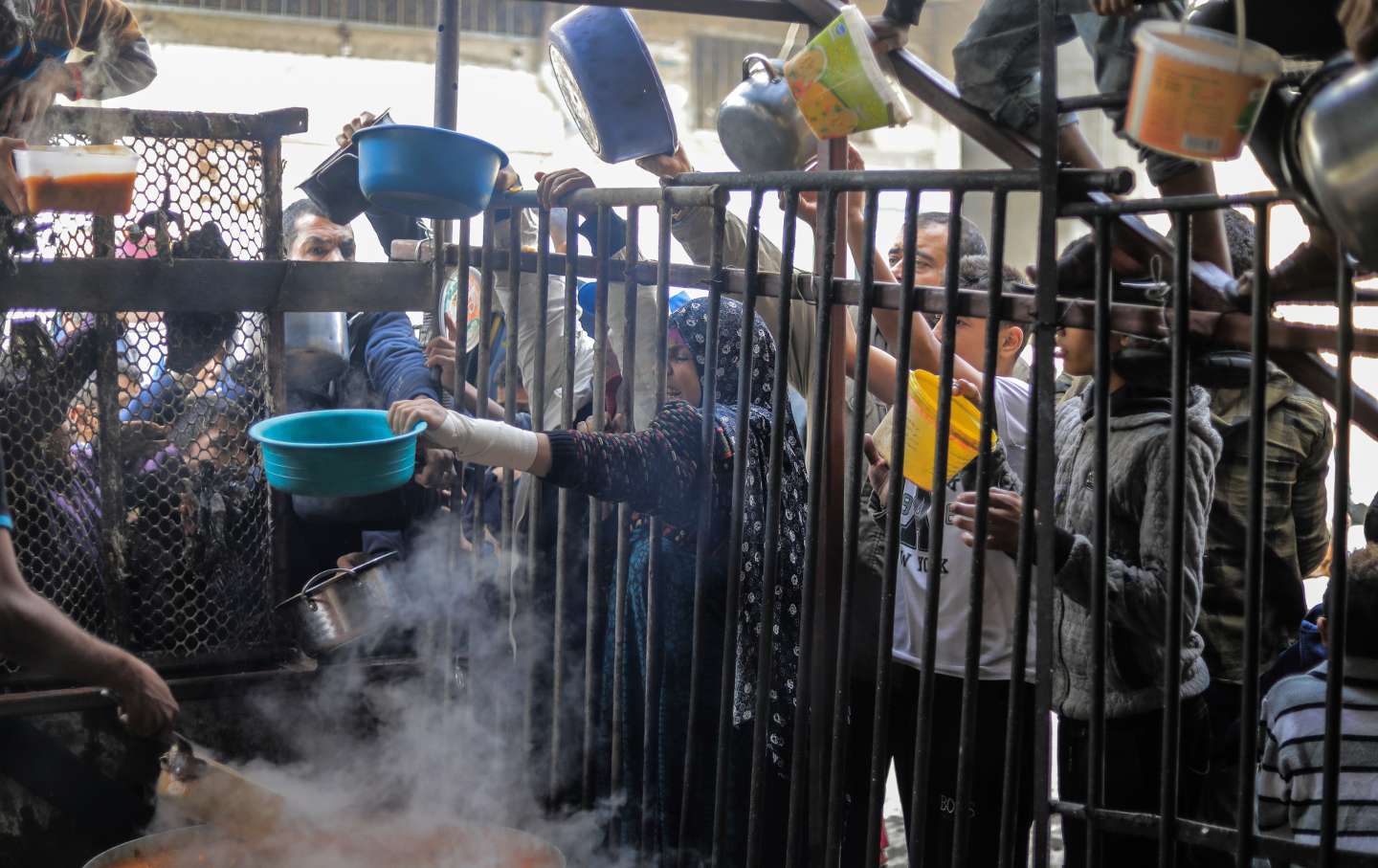
Palestinians gather to collect food cooked by volunteers for people who evacuated from Khan Younis to Rafah.
(Mohammed Talatene / picture-alliance/ dpa / AP Images)Over the past month, The Nation has been publishing excerpts from the diary of Palestinian writer and politician Atef Abu Saif, who was visiting relatives in Gaza on October 7 and has been there ever since. As this third collection of entries, which spans from November 23 to December 5, begins, Saif has fled with much of his family from the north of Gaza to Rafah in the south and is waiting to be allowed to cross into Egypt and escape the war.
Thursday, November 23
The lists for all those allowed out [of Gaza], published the night before online, are coordinated by the Israelis, with the Egyptian Army following their orders. Most of the dual-nationals have now left, with one major exception: the Egyptian-Palestinian, a very large contingent. I’ve been told that in a few days, we too will be added to the list. I know how fed up [my son] Yasser is with the situation and how much he craves a break from it all and a return to normal life.
On our way to my friend Mamoun’s house, I popped into the Nasser Hospital. This is the largest hospital in Khan Younis, named after the great Gamal Abdel Nasser of course, and located right beside the market. I joked with Yasser that he’d now completed his tour of the four biggest hospitals in the Strip: Al-Shifa, the Indonesian, Al-Hilal, and Nasser. “Never mind the hospitals, Dad. I’m the first of my brothers to even visit this town!” he replied. “Well, tomorrow we go even further south—to Rafah!” He knows it’s not for the border, but a work visit. From his smile, I can tell he’s looking forward to it all the same.
According to rumors, the truce was set for 10 the next morning. But that night, we heard shelling to the east of Khan Younis. Explosions sounded every other minute. “They want to kill as much as they can before the truce,” I told Mamoun. In the morning, I will read about the attacks here and in the north, including Jabalia. Dozens of places were struck and are presumed dead. But the details will be scarce. Very little information is now coming out of the north, as there is practically no Internet there and mobile signals are weak.
On my way to Rafah, an F16 strikes a residential area near Khirbat Al-Addas, on the left side of the street as we pass.
Friday, November 24 (Day 1 of the truce)
The very word “truce” feels like a blessing. Most Gazans have never left the Strip; they don’t know what life feels like where war is not the norm; they don’t know what freedom is either. They know they want it, but they’ve never really tasted it.
Read the rest of the diaries
Most of those I meet [in Rafah], who’ve moved from the north, completely regret their decision. The living conditions in the shelters they’ve found in the south are dire. Many of them had already been homeless for weeks before they came here. My sister Eisha, who’s been staying in Deir Al-Balah, texted me yesterday saying that every minute she’s alone she cries. She misses the life she had built for herself, in her home in Tal Azzatar. The kids missed it too. Desperately.
Rafah was full of life, just as Khan Younis had been. People flocked in from all directions. Carts, stalls, and shops were selling citrus fruit, olives, oil, nuts, meat, and kebabs. Amongst all these aromas is also the smell of the desert. Due to the lack of gasoline, all cars in the Strip are now running on vegetable oil. When you step out onto the street, the smell of burning cooking oil hits you, and for a moment you think you’ve entered a busy, open-air kitchen.
I bought sandwiches and nuts for Yasser and I to eat as we walked to Tel Al-Sultan, to meet my brother Ibrahim and numerous other relatives who’ve been there for several weeks. I phoned Mohammed, who’s staying with his wife’s family in Shaboura camp, and we met on the main road and walked together east.
When we get there we see how Ibrahim has been surviving. He shows us the small tent he has erected at the school they’re staying at. He had to buy wood, cloth, and string to make it. Unfortunately, there’s no mattress or pillows inside, he simply has to sleep on the ground.
With the influx of displaced people, the most sought-after items are kitchen utensils (plates, spoons, etc). Hundreds of families need to start their life from zero, here, and the first thing they need to do is eat. Ibrahim explained that people will buy any old second-hand item here from the locals. If someone has a broken spoon or a rusty knife, they’ll buy it.
Popular
“swipe left below to view more authors”Swipe →I walked with Ibrahim from the school he’s staying at to the UN Storage Base, a fenced-off area, not unlike a military base, where aid is traditionally kept before being distributed. Some 22,000 are now living in this base, mainly from Jabalia camp and the surrounding areas. The base is made up of a number of enormous hangars, inside of which hundreds of families have erected tents. It is a new refugee camp, effectively.
As I looked around, I felt like I was traveling back in time to the birth of my own camp, Jabalia, and couldn’t help wondering what new streets were now being worn out into the mud right in front of me, what new neighborhoods were being created that decades later would still carry a trace of this layout.
I also went to see Jumma, a relative and a good friend, who moved from his house north of Jabalia to Rafah three weeks ago. He has managed to create his own private space just outside one of the hangers. His “place” is palatial, relatively speaking, consisting of four “tent rooms’ made out of blankets and nylon. I walked from one “room” to the next, feeling the clean yellow sand under my bare feet. “You’re reconnecting with your Bedouin roots,” I joke. We made tea on a little fire set in the sand outside the first tent. In the biggest “room,” 15 friends and relatives gathered. It was like a party almost.
Saturday, November 25 (Day 2 of the truce)
Yesterday, many people took to the Salah Al-Din road, in the hope of simply walking back north to their homes. The Israeli army prevented them, of course. Two people were shot. The army used tear gas and live ammunition to scare the returnees.
Some displaced people who have remained in Gaza City and the north tried to return to their homes yesterday, mainly in the very north and very west of the Strip. But the army fired at them. Dozens were killed and many of the rest were sent fleeing back. All they wanted to do was check their property, to see if they still had a home or not, and they were killed for wanting to know.
Some of the returnees managed to find secret paths back up to the north, out of sight of the soldiers and their guns. It’s a risky thing to attempt but what part of our existence right now isn’t risky? Some of those that made it back took photos and recorded videos. The most shocking images are the ones of the dead bodies thrown in the streets, lying around untouched. Decapitated bodies, missing arms and legs, bodies eaten by dogs. Even animals killed by the bombing. The city looks like a surreal open-air morgue.
A mother returned to find the bodies of her children. She must not have believed that, after four weeks and no news from them, they would still be alive. They needed a miracle, and in this war there are no miracles.
There has been no news recently from my father and his wife, or from my sister Asmaa and her family. I’ve tried to call many times, but the north seems to be cut off. There is no signal there, even during the truce. The last thing we heard from the north directly was about the severity of the attacks just before the truce. We can only pray that they made it through. Today I feel what it really means to be a displaced person. Up until now, in the north, things were more dangerous, my life was at risk every minute, I saw death up close many times, but at least I was in my hara—my home turf.
After meeting Ibrahim, we walk to the European Hospital to visit Wissam and the others. We spend three hours with them, then head to Khan Younis. The only way to get there now is either by donkey cart or on foot. I look into Yasser’s eyes and ask what he is in the mood for. He is up for the walk, so 40 minutes later we finally arrive in Khan Younis town center and the Nassir Hospital. Yasser has arranged to meet Khalid here, our neighbor from Saftawi, who moved with his family to Khan Younis 40 days ago. I’m relieved that Yasser is finally able to hang out with one of his friends.
Sunday, November 26 (Day 3 of the truce)
The news is full of the prisoners and hostages, along with statements being made by leaders around the world. Everyone seems happy that they’ve been released, but no one mentions the infinite price that has been paid for it by the innocent people of Gaza. Thousands still lie under the rubble, denied a decent burial. Hatim and Huda, my brother- and sister-in-law, and their son Mohammed have now been under the ruins of their house for 43 days. No one thinks of them. World leaders congratulate themselves, as my in-laws rot in the rubble.
We go to visit my sister Samah who is currently taking refuge in a school in the western suburbs of Khan Younis. Two days before the war broke out, Samah gave birth to her third child. Her home is very close to the beach at the northernmost tip of the strip. She fled and shortly after her home was destroyed at the start of the land invasion. At first, she took her family, including her newborn baby boy, to a school in Al-Nasser Quarter, west of Gaza City. Then, two weeks ago, when the tanks shelled the school’s street, they all had to flee again, this time to the south. She carried everything she owned with her, including her newborn baby.
We meet in a classroom and see the tiny home she has made for them all in one corner of it. The classroom has been divided into six sub-rooms, each with a whole family living in it. Samah’s husband is a fisherman. He is angry that he has lost a whole season of work this winter. He had been expecting a prosperous season, but the war had other plans.
On our way back, we are attacked by dogs who try to come right up to us as they bark. There are many lost animals in the streets including beloved pets, their owners dead or injured, or unable to take them in the chaos of their evacuation. Now they roam the streets, unfed, homeless, desperate.
There is still no cell phone reception in the north. Some Internet connections were reestablished so my brother Ibrahim could text one of our relatives who stayed in the camp to ask about my dad. “He is ok,” he tells me. Such relief. “What about [our sister] Asmma?” I ask. “No idea,” he replies darkly. I suggest he tries to contact some of her neighbors via WhatsApp. Since yesterday more people have attempted to return to the north, but the Israelis didn’t stop them. But from those that got through, more astonishing stories, images, and videos have circulated about the devastation: images of those found dead in the streets, rotting, in the fields, under the rubble of farms.
The longest war against Gaza lasted for only 51 days. That was 2014. We didn’t think anything could ever be as bad as that. Today is the 51st day of this war, and it feels like we’re just about to enter Round 2.
Monday, November 27 (Day 4 of the truce)
Yasser asked again: “When we are leaving?” He means of course to Cairo. “Soon,” I said. This soon might be tomorrow, or it might be after a week. No one knows. “We are waiting for our names to appear on the Egyptians’ list,” I continue. “Then we can go.” It’s an answer that doesn’t even convince me.
We walked for half an hour into Khan Younis town center where we were able to get a car to the European Hospital. We’d been informed that Wissam would soon be able to continue her treatment in Egypt. Hanna told me on the phone, adding, “They seem serious this time.” A few days ago they’d said the same, and told her to be ready to be driven to Egypt. But then they canceled for no reason. This time, they told her to get her documents and papers ready.
On our way from Khan Younis to the European Hospital, cars were queuing up outside the petrol station waiting to refuel. The queue was over a kilometer long. Drivers stood beside their cars, some smoking, some catching up with other drivers in the queue. Our driver reflected that the queue wasn’t worth it, they might be waiting days. “I’ll stick with cooking oil till the queues go,” he said. “Hope you’ve got a lot of cooking oil,” someone shouted back. Everyone knows normality isn’t going to return any day soon. “OK, OK, I’ll wait then,” the driver replied, before launching into a lengthy complaint about merchants raising the price of cooking oil.
On the way from the European Hospital to Rafah, we pass another queue: this one consisting of people with gas cylinders waiting to top up on cooking gas. The queue is even longer than that at the petrol station, maybe a kilometer and a half. We stare at them as we drive past: men, women, teenagers, elderly. They all stand alongside an almost endless line of empty cylinders, set down by their owners, each waiting patiently in an unmoving queue. The refilling station doesn’t seem to be operating yet. The queue hasn’t even begun to move. “They’re waiting for the tanks to arrive from the Crossing,” the driver explains. “They thought they’d get here early.”
No one will be allowed to completely fill their cylinder. The amount of gas allowed into the Strip was limited, to make us suffer. The way every condition of the truce was designed to make us suffer. To grind us into the ground, kill us, or force us to leave.
This morning, Jumma suggests that we start teaching classes for the children in the new camp. He asks one of our relatives who is a teacher if she can help him organize it. She confessed she is extremely distracted right now, as her husband was arrested on his way from the north to the south and hasn’t been released. Nonetheless, the idea needs to be pushed forward. Probably a whole year will be lost from our children’s education. So we must start fighting back now.
Tuesday, November 28 (Day 5 of the truce )
During the night I got up to cover Yasser with additional blankets. It was so cold. When we first laid our mattresses on the sand, it dawned on me how hard the next few days would be. The cold seemed to seep up from the ground, like damp.
This morning, a football suddenly flew through the [tent] opening onto my lap. I smiled to hear three kids calling politely from outside, asking for their ball back. Then, all of a sudden, ten more kids seemed to have gathered at the little gate that Jumma had set up to separate our tents from the rest of the camp. I joke to [a] boy that he should be in school. He points to the sky and says simply: “War.” “Do you like school?” I ask him. “I don’t like math.” I laugh. “When I was your age, I didn’t like math either.” “And I also don’t like war,” he adds loudly as if to make himself very clear.
My sister Eisha phones me to say she now absolutely regrets leaving the north. “When you are in your own home, you’re comfortable even if bombs are falling outside. You’re still at home. It’s where you belong. Where you feel safe, even when you’re not safe.” “But it was getting dangerous in Tal Azzatar [her neighborhood],” I contest. “Your family’s lives were at risk.” “Can’t we go back?” she asks, desperately, knowing the answer full well.
One of my other sisters, Asmaa, then rings me. I’m so relieved to hear her voice. She is one of the few to have stayed in the north. The sound of her voice and the voices of her kids makes my heart skip a beat. But then she tells me about one of her brothers-in-law, who has been seriously injured. When I ask her if she’s still going to stay there, she just says, “We’ll see.”
Wednesday, November 29 (Day 6 of the truce)
Coming back from Rafah, on the road to Khan Younis, we had to wait five minutes to let 10 huge lorries, full of humanitarian aid, go past. They were coming from the Rafah Crossing and were traveling at speed, as if knowing they didn’t have long before the truce expired.
I went to see my sister Eisha in Deir Al-Balah. This was the first time since I left the north that I’d experienced a normal form of transport: a bus, fully operating again, taking people from Rafah to other towns in the north! Yes, Deir Al-Balah and Nuseirat are now “the north” for us. The new north. Yasser and I even got our own seats! Such luxury!
I phoned my friend Saed Saftawi and asked if we could stay the night at his place. Saed lives with his six brothers in six separate houses along the same road. Now, some 300 of their relatives from Gaza City have moved in to live with them. Today is the last day of the extended truce and it seems we can’t keep hoping for yet another extension. People are so desperate for it to be extended, though, whatever the terms. “We don’t need more truces,” Saed says angrily. “We need the war to stop. Full stop. We can’t go on living our lives under the conditions of a truce.” I smiled and said, “Our life is a truce, Saed.”
Today is Palestine International Solidarity Day. Most people forget that November 29 is the day when, in 1947, the United Nations voted in favor of partitioning Palestine, as it was, into two states: one for the Jews and one for the Arabs. The Jewish one was realized the following year after 800,000 Arabs were driven out, their men shot, their women raped, their villages set on fire, their townspeople slaughtered. Terror was what destroyed that half of Palestine, and what gave birth to the new country. Terror. As Palestinians, we call it the Nakba, but after 75 years the rest of the world still doesn’t even know what the word means. Just as now, when we say the “New Nakba,” the world refuses to learn.
Friday, December 1 (End of the truce)
Living through a war is like having to renew your contract with life every day. You pray the night won’t take it. Then, in the morning, you sign on the dotted line once again. You never get more than a one-day lease. The truce was only an extrapolation of the same deal— eventually, you always default on the peace and then have it ripped away from you.
Last night, none of us could sleep, we were all praying too hard for the truce to be extended. As midnight approached, there was still no news of a possible extension. The uncertainty was unbearable. It began to dawn on us that tomorrow there wouldn’t be any extension. The efforts of the intermediaries had failed. The sound of the attacks on the villages and towns to the east can be heard very clearly where we are. Our breakfast remains uneaten, as we sit listening to the explosions.
The Israelis continue to drop leaflets on us. This time they ask the inhabitants of the villages and towns east of Khan Younis to evacuate the region and head towards Rafah. Rafah, not Khan Younis, despite it being closer. This can mean only one thing: The town of Khan Younis and its adjacent camp are next.
Today is “Water Day” in Mamoun’s house, a twice-weekly occurrence when all the members of the household work together to carry gallons and gallons of water from the well up the stairs to fill the tanks on the fourth floor. It’s a hard shift. Men, women, and children all roll their sleeves up and take part. We all work till noon until the tanks are full. Everyone is exhausted, but also happy with the sense of accomplishment: We will have water for the next three days at least.
A new map has been issued by the Israelis that divides the Strip into hundreds of blocks, each one given a special number. We’re supposed to learn these numbers and follow Israel’s orders as to which block should do what. So farewell, beautiful names—villages with names like Juhor El-Deek (literally “the burrow of the rooster’), and hello meaningless, dehumanized numbers. As Palestinians, we’re used to this: To even exist here, we have to get a haweya, an Israeli-monitored ID card and number. But now our land has to be stripped of its names too. They want to bulldoze it with the old myth that no one ever lived here, that the land isn’t steeped in a million memories.
Saturday, December 2
All of a sudden, with the resumption of war, Khan Younis has become the Israelis’ primary target. It’s like they have followed me here. Last night, shelling and missile strikes could be heard on all sides. I hadn’t seen a “ring of fire” style attack since I left the north, but as I lay on Mamoun’s floor, trying to sleep, the orchestra of war struck up again. Likewise, the old habits kicked in: counting the attacks, speculating on the types of rockets being used, wondering where each strike landed.
I woke up at 6 am. Mamoun was already awake. He listed the places, houses, and streets that had been hit while I was sleeping. Though strikes happened all over, the fiercest ones were in the eastern neighborhoods of Khan Younis. A ground invasion has started there. Civilians are being told to leave their homes. “Do you think the Israelis are going to invade our neighborhood?’ Mamoun asks me. From my own experience in the north, I can only say yes. It might take some time, it may even take longer, but they are coming. The Israelis burn everything in front of them to the ground. They leave nothing standing: no buildings, no trees, no people. They kill everything. “Well, I’m not going anywhere,” Mamoun says. “I left my flat in Rimal and now it’s rubble. From here, I have nowhere left to go. I won’t move anymore.” He reminds me of the way Bilal and I used to talk.
In the north, the Israelis have resumed their operations, mainly in western parts of Jabalia. I phone my sister Asmaa who’s been sticking it out in her house in Falouja. She sounds terrified as shrapnel from a rocket struck her back garden yesterday and incinerated all her plants. On the same night, a huge fire raged through a nearby souk spreading into the complex beside it and a neighboring school. “Everything was on fire,” she says. “The heat from the flames made it warmer than daytime.” After speaking to her, I call my father but can’t get through.
This morning, some 80 new members of Mamoun’s extended family arrived from Karara, a village north of Khan Younis. As the place becomes more crowded, I realize family comes first, they are Mamoun’s priority. We need to move to Rafah and look to stay with my brother and cousins.
We find a car to take us back to Rafah, but we end up spending an hour waiting at one particular intersection. A huge crater sits in the middle of the road where an F16 missile struck last night. The traffic is backed up around it, on both sides, as drivers try to keep their cars from toppling over the edge.
Sunday, December 3
My family home was destroyed last night. The F16 pilot chose our particular house. With all the tech at their disposal, the Israelis could’ve seen it was empty. But still, that was the pilot’s mission last night, to destroy my family home and six others. I didn’t think of saying goodbye or “Stay safe” to the house. I assumed I’d see it all again: the wooden staircase, the photos from my graduation, the framed photo of my late brother Naeem that hung on the wall the whole time he was in jail, and ever since.
My dad no longer has anywhere to sleep. He WhatsApp-called me at 6:30 this morning. “The house is gone,” he said, and nothing else. His voice was trembling and I could see the tears in his eyes. Now a 74-year-old man is homeless for no other reason than someone’s having made a strategic decision to make him suffer.
Things are beyond dire in Jabalia. I call my sister Asmaa. When you hear the ringing tone, it’s always such a relief. Phones are usually destroyed when their owners go under the rubble. So if her phone is still working, maybe she’s alive. Eventually, on my third attempt, she picks up. “Good morning,” she says. I can breathe now. She goes on to describe the horrors of the previous night, how she counted the minutes for the endless string of explosions to end. She could see the neighbors’ building on fire, and couldn’t work out which side of the house the missiles were landing, they were so close. It was only when the first ray of dawn crept through the shattered window that she realized she’d made it. “I’m not sure I’ll see another dawn, Atef,” she says.
Before turning in, I chatted with my great-aunt Noor. She is possibly the only surviving family member who was actually born in Jaffa, before the Nakba. With her mother and father, she had to flee their beautiful house to spend most of the rest of her childhood in a tent, a few miles north of here. My whole life she’s told me the story of the day she had to drop her textbooks and run out of the house and down the street when she heard shells flying over from Tel Aviv. She remembers how upset she’d been at the time that she hadn’t brought her textbooks with her. She loved her school in Jaffa, and she never went to another school again. As she told me the story again, last night, I could tell she was mixing up some of the details with the hasty departure from her house in Jabalia a few weeks ago.
Tuesday, December 5
Last night, I went to the European Hospital to visit my father- and mother-in-law. Wisam has finally been taken by car to a hospital in Egypt, leaving them alone. My mother-in-law has extreme mobility issues, and cannot really take care of herself. She needs round-the-clock care.
Yasser asked if he could stay with them in the hospital. He was worried about them in case they suddenly got evicted. I told him there would be little he could do if they were. In the end, he insisted on staying.
The morning Wissam left, she was told that her final destination would be a hospital in Port Said. But after they took her, we weren’t able to reach her for hours. It was only that night that Hanna managed to speak to her. She said they had already passed the queues at the Crossing and were now in Egypt, heading across North Sinai. The two young girls, Wissam’s sister Widdad and Wissam, are taking their first trip outside Gaza, stripped of their parents, their siblings, any form of support, and in Wissam’s case, three of her limbs. They do not know what the world looks like outside the perimeter fence. They are escaping the prison in a way they never wanted to.
As of 7 pm, we no longer had any mobile signal. The only connection with the world outside the camp was the sounds and lights of the explosions in the distance, and the roaring of F16s to the northeast of us, heading to Khan Younis. We were all thinking about our loved ones still in the north. Ibrahim said he received a call from a friend there saying that the “rings of fire” have been dropped on every part of Jabalia. Tanks are reported to have entered the Falouja neighborhood and are rolling toward the center of the camp. “We don’t see anything,” his friend had said. “We see death and darkness only.”
My brothers Mohammed and Ibrahim wake up this morning, around 5:30, to get the fire started. They prepare tea and Mohammed boils some milk for his kids. Around 8 am, they set out the breakfast. For once there is bread. It’s a miracle. Before long the kids start playing hide and seek around the tents. The camp quickly comes to life. I look at Mohammed’s 4-year-old son, Ahmad, and think about how his grandfather, my dad, at his age would have been playing around a tent just like this.
I start my daily “calling session.” This is where I try to call each member of my immediate family in the Strip as well as my closest friends, to check they are all OK. I phone my dad first, but no one is reachable in Jabalia. Then I try Halima, my sister, who moved to Khan Younis, but she too is unreachable. My friend Mamoun, also in Khan Younis, is unreachable. Then I call my son Yasser at the hospital. He says he’s OK and was happy to spend the night with his grandparents. Then I try my sister Eisha, who I haven’t been able to reach for two days. After several attempts, I finally hear her voice say “Hi.” She says she hasn’t had bread for the last three days. Her kids ask for it every day. My friend Mahmoud, who works for the Red Crescent, told me that international organizations, including the UN agencies, are refusing to deliver aid to the central governorate or to Khan Younis either. The agencies told him it is not safe to drive there, as the Israeli forces have not approved such deliveries. This means that all aid will be kept back in Rafah.
It’s the same old story. What they did to divide the Strip into a “north” and a “south,” they are now doing to divide the “south.” Khan Younis is “unsafe” now, and everyone must go to Rafah. It’s transparent, what they’re doing, and still no world leader will speak a word against it. As if frozen, immobilized by the fear of saying something out of line, something that might jeopardize their petty little careers. Meanwhile, back in the Strip, the cycle of destruction continues: on repeat, faster and faster, with the places we are allowed to shelter in growing smaller and smaller.
Thank you for reading The Nation
We hope you enjoyed the story you just read, just one of the many incisive, deeply-reported articles we publish daily. Now more than ever, we need fearless journalism that shifts the needle on important issues, uncovers malfeasance and corruption, and uplifts voices and perspectives that often go unheard in mainstream media.
Throughout this critical election year and a time of media austerity and renewed campus activism and rising labor organizing, independent journalism that gets to the heart of the matter is more critical than ever before. Donate right now and help us hold the powerful accountable, shine a light on issues that would otherwise be swept under the rug, and build a more just and equitable future.
For nearly 160 years, The Nation has stood for truth, justice, and moral clarity. As a reader-supported publication, we are not beholden to the whims of advertisers or a corporate owner. But it does take financial resources to report on stories that may take weeks or months to properly investigate, thoroughly edit and fact-check articles, and get our stories into the hands of readers.
Donate today and stand with us for a better future. Thank you for being a supporter of independent journalism.
More from The Nation
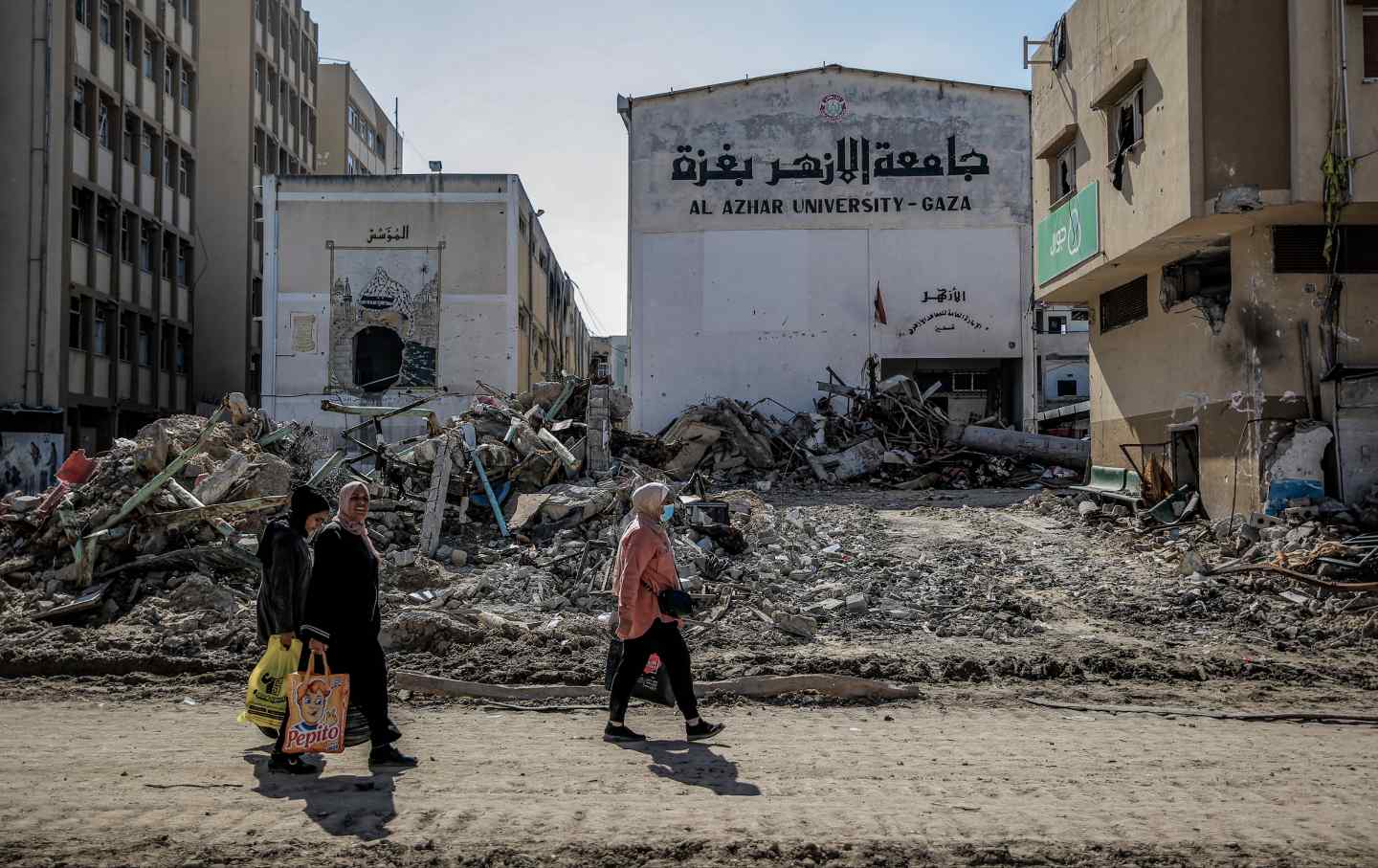
Every University in Gaza Has Been Destroyed. So Have These Students’ Dreams. Every University in Gaza Has Been Destroyed. So Have These Students’ Dreams.
The class of 2024 was supposed to graduate this year. Instead, they are trapped in the hell of Gaza, and their futures are unknown.
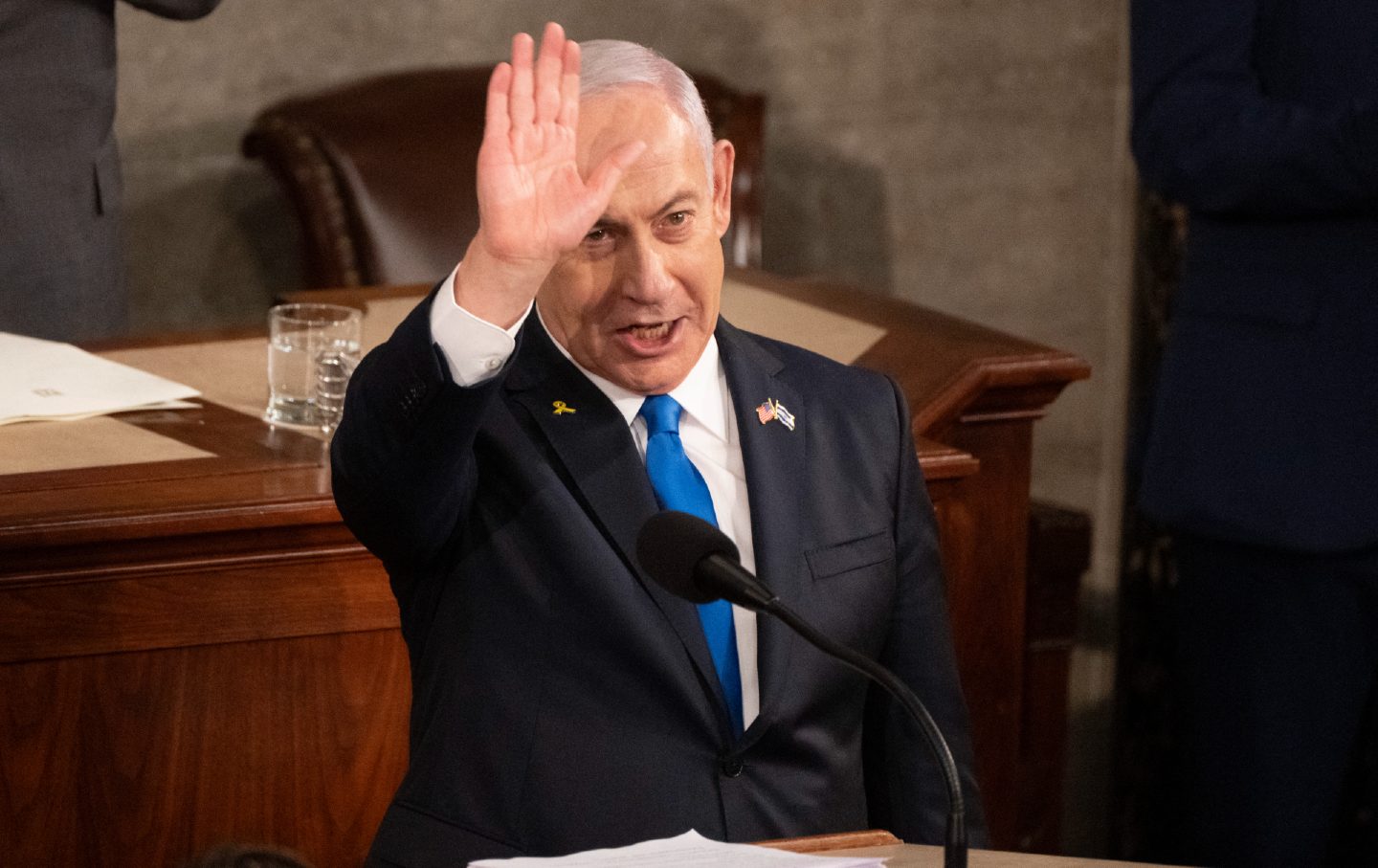
Netanyahu’s Theater of the Grotesque Netanyahu’s Theater of the Grotesque
Yesterday, Congress lauded and applauded the Israeli prime minister, who has been accused of war crimes by the ICC, even as his victims continued to die in Gaza.
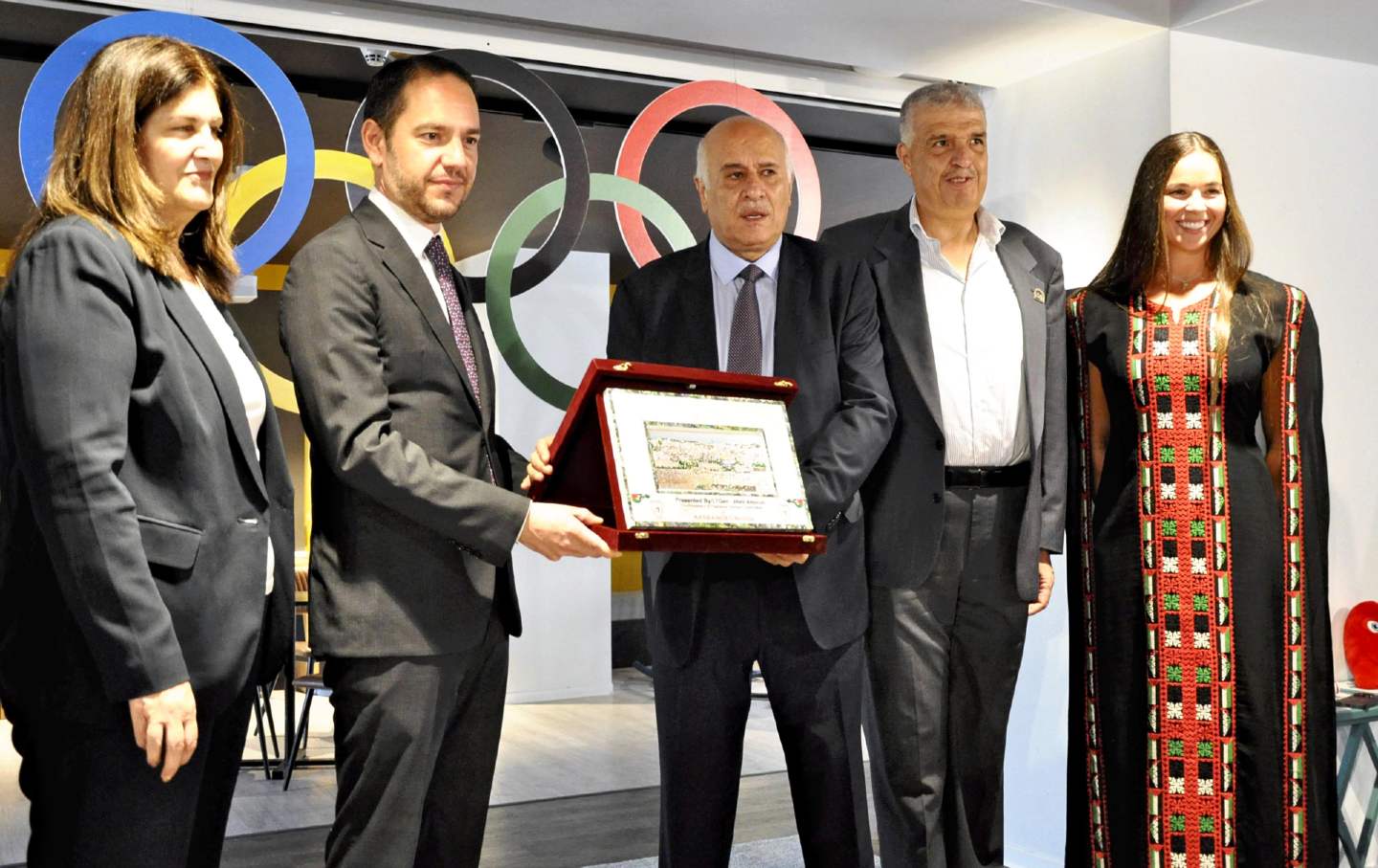
Palestinian Olympians Are Competing as Their World Burns Palestinian Olympians Are Competing as Their World Burns
Palestinian Olympians will make history in Paris, despite unfathomable conditions of genocide.
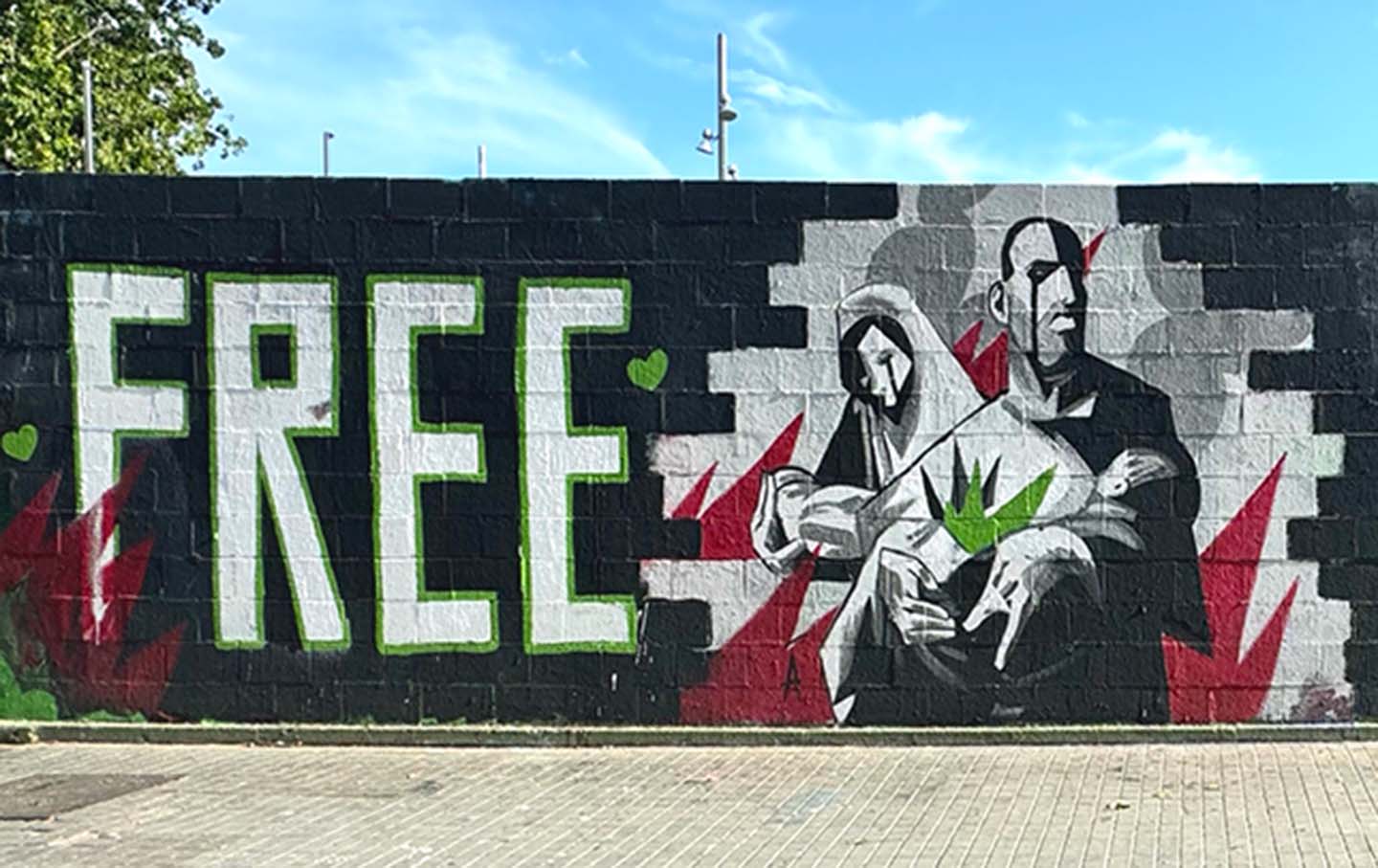
International Solidarity With Palestine International Solidarity With Palestine
Street mural, Barcelona, Catalunya, Spain.
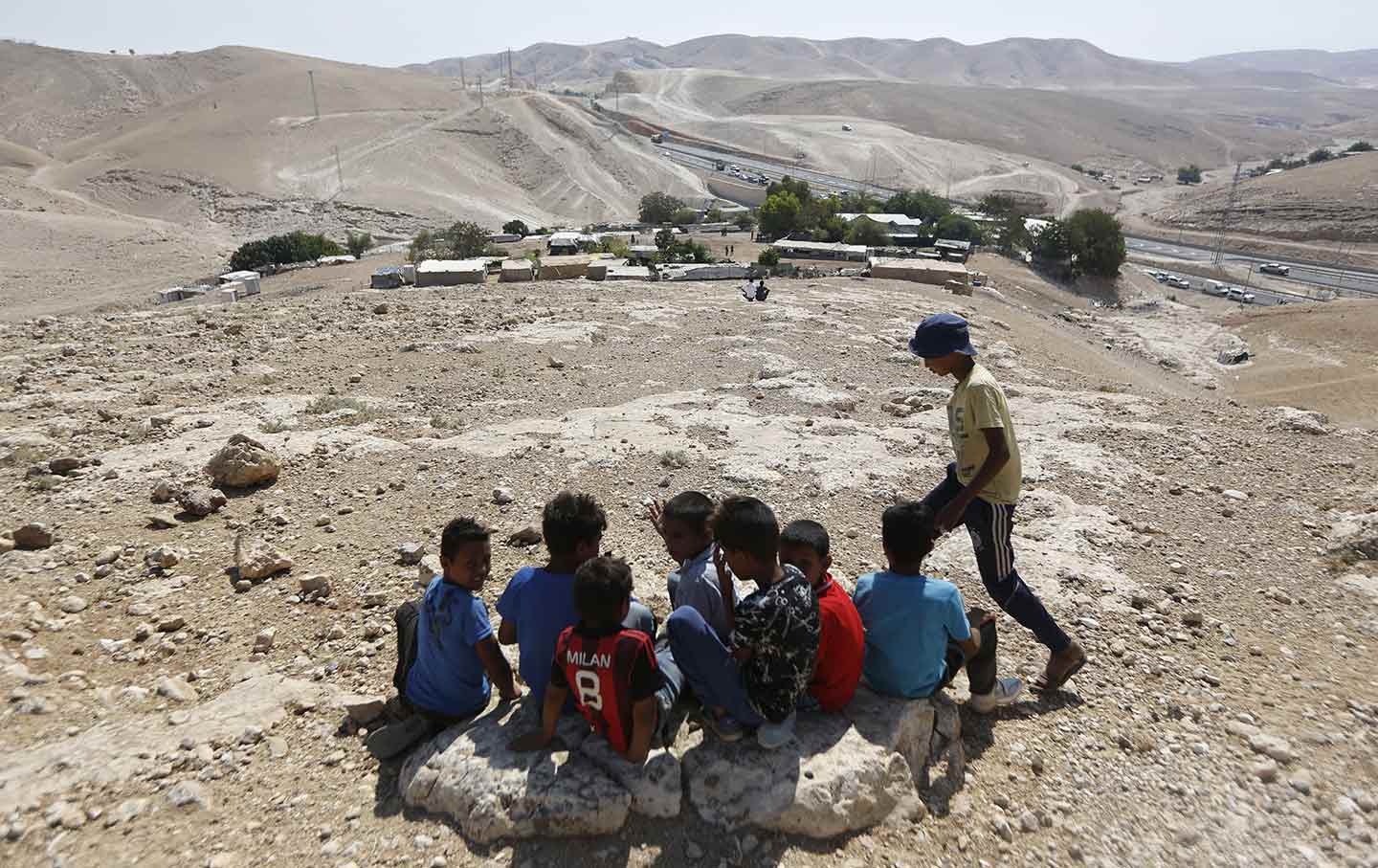
The Horror in Israel and Palestine Began Half a Century Ago The Horror in Israel and Palestine Began Half a Century Ago
From the very start, Jewish violence has accompanied the proliferation of settlements.
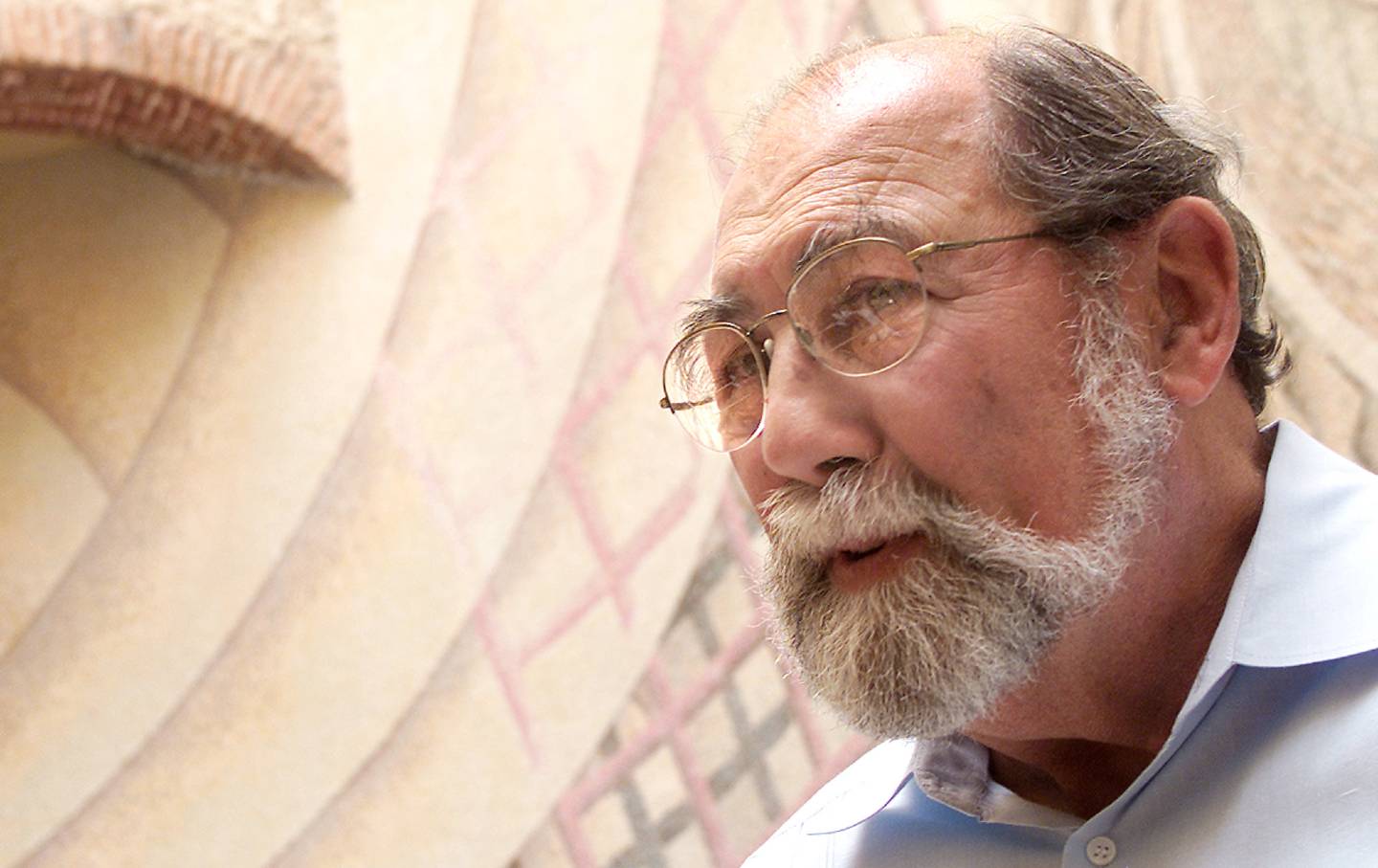
Wayne Smith Devoted His Career to Dialogue and Diplomacy Wayne Smith Devoted His Career to Dialogue and Diplomacy
The former Foreign Service officer liked to say “Cuba seems to have the same effect on American administrations as the full moon has on werewolves.”


